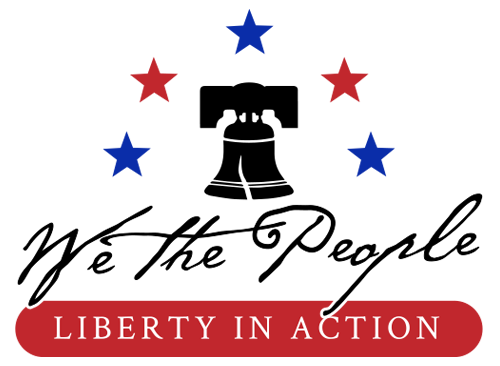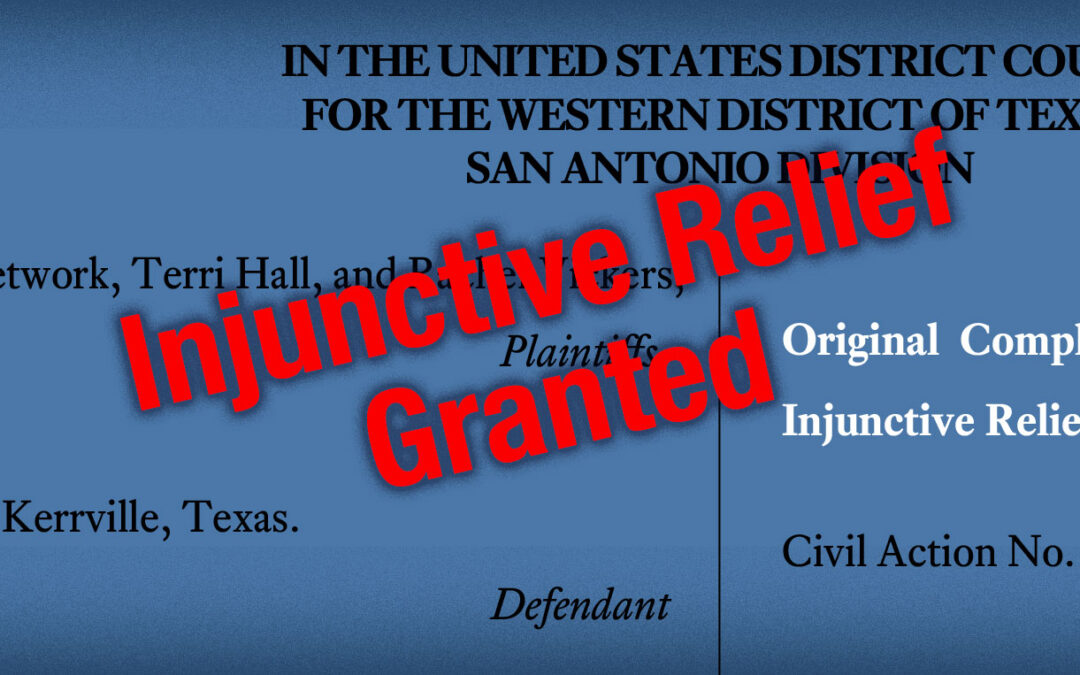FOR IMMEDIATE RELEASE
Tony McDonald
Plaintiff’s Attorney
PHONE: (512) 923-6893
Connor Ellington
PHONE: (214) 356-0777
Plaintiff’s Attorney
EMAIL: tony@tonymcdonald.com, connor@tonymcdonald.com
Terri Hall
Liberty in Action Board Member & Plaintiff
PHONE: (210) 275-0640
Rachel Vickers,
Kerr County Republican Precinct Chair #314, LIA member
PHONE: (830) 285-8885
Liberty in Action wins partial preliminary injunction in First Amendment lawsuit against city of Kerrville ordinances
(Kerrville, TX – Wednesday, September 11, 2024) Yesterday, United States District Court Judge Xavier Rodriguez granted We the People – Liberty in Action and its plaintiffs, Terri Hall and Rachel Vickers, injunctive relief on some key elements of two recently passed ordinances by the city of Kerrville, Texas. The court found that two sections, Sections (a)(2) and (a)(8), of the city’s electioneering ordinance were problematic and run afoul of the First Amendment, particularly its prohibition on ‘congregating,’ which the city admitted included simply two people talking to one another outside the 100 foot marker.
“…The phrase ‘congregate’ apparently bars all speech when approaching voters entering or exiting their vehicles in Voter Parking Spaces and some undefined amount of political advocacy speech when approaching voters in the rest of the parking lot outside of the Electioneering Zones,” Judge Rodriguez continued, “In essence, Defendant has prohibited vast swaths of speech, without even defining these limitations in writing” (emphasis ours).
So the city’s attempt to restrict citizens’ ability to even speak to a voter within 240 feet of the polling location, and its map that attempted to put election volunteers in a box too far away from voters to ever make any personal contact with them, can no longer be enforced.
Regarding the city’s Canvassers and Solicitors ordinance, the court found that requiring a permit (including paying a fee, submitting to fingerprinting, and a background check) in order for someone to approach their own neighbors was unreasonable and enjoined that provision as well.
Plaintiff’s attorney Connor Ellington declares, “We are encouraged that some sections of the city of Kerrville’s unconstitutional ordinances have been preliminarily enjoined. For those that the District Court declined to enjoin, we look forward to asking the Fifth Circuit to enjoin the content-based restrictions on our clients’ First Amendment rights.”
“This is a good first victory for the First Amendment and our ability to educate and engage voters at the polls! While we believe these ordinances are entirely unconstitutional, the 5th circuit has a great track record of upholding and protecting Americans’ First Amendment rights. We look forward to more victories ahead,” believes Terri Hall, LIA Co-Founder and Board Member.
The city tried to argue that the Callioux Theater polling location (the only one owned by the city) was not a traditional public forum or designated public forum but rather a non-public forum and therefore subject to a lower standard of judicial scrutiny. However, the State of Texas has created a designated public forum beyond the 100-foot boundary at polling places.
LIA contends government restrictions on speech in a designated public forum are subject to the same strict scrutiny as restrictions in a traditional public forum according to Supreme Court precedent in Pleasant Grove City v. Summum, 555 U.S. 460, 469-70 (2009). Areas covered by the Electioneering Ordinance are designated public forums. The State of Texas has also by statute designated the area on property hosting a polling place and beyond the 100-foot marker as a designated forum for electioneering. Even owners of private property (such as churches) used for a polling place “may not, at any time during the voting period, prohibit electioneering” outside the 100-foot zone. TEX. ELEC. CODE § 61.003.
So given that the court used a lower standard of scrutiny (reasonableness) to grant the partial injunction in this case, Liberty in Action plans to appeal the remaining provisions to the 5th Circuit in Louisiana to seek further relief.
###

